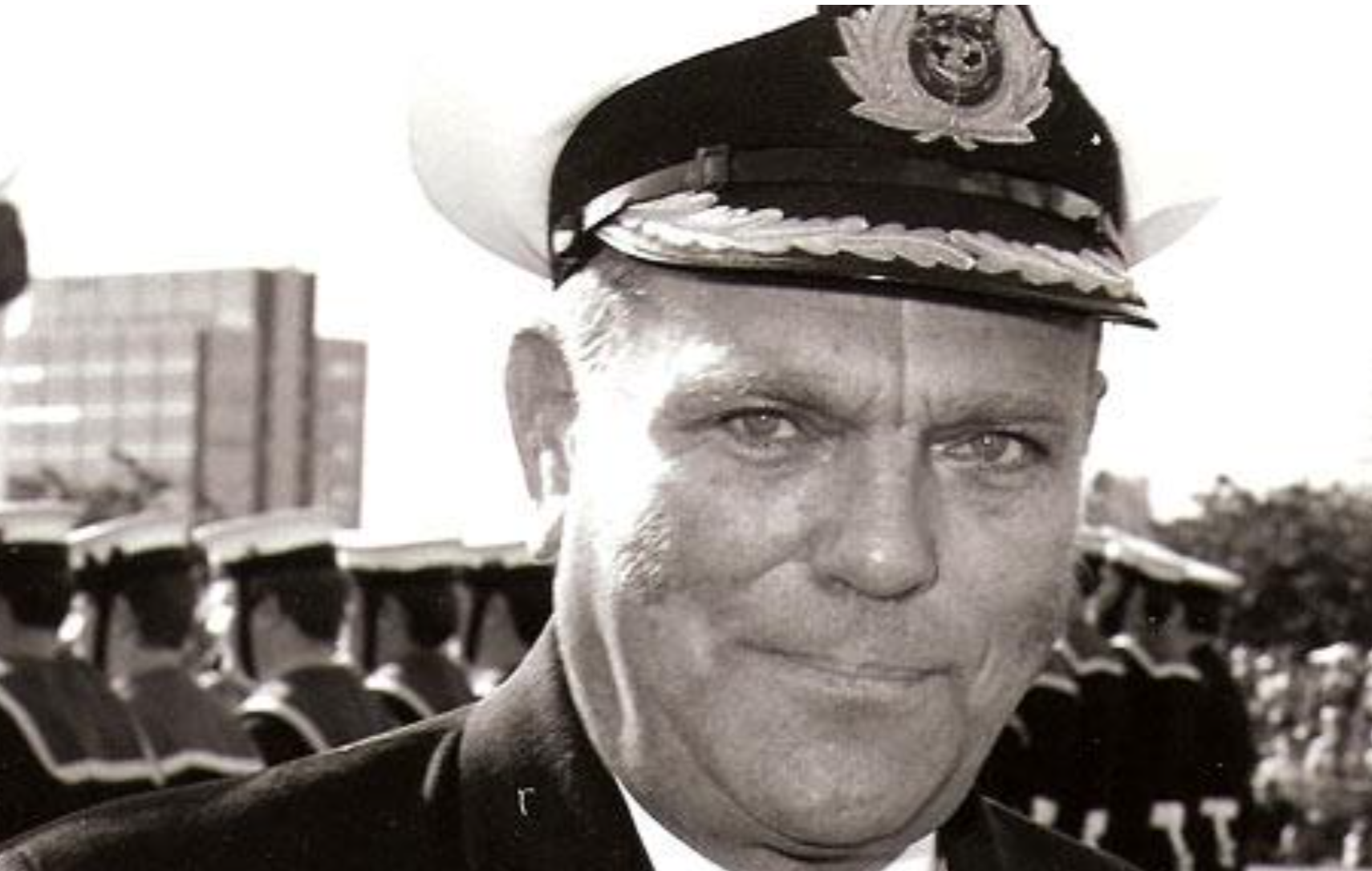Samuel Clarke Dunlop.
Samuel Clarke Dunlop was born on November 27 1922 at Carnlough, Northern Ireland, the son of a master mariner. He was educated at Belfast Royal Academy.
On going to sea in 1939 he was an apprentice in the Bank Line tramp ship Cedarbank, which was in Buenos Aires when war was declared. After being painted grey and black and loaded with a cargo of grain, she sailed for home, avoiding the German pocket battleship Graf Speewhich was raiding shipping in the South Atlantic. Cedarbank was torpedoed by U-26 not long after Dunlop left her.
Dunlop – who is thought to have earned his nickname "Black Sam" because of the colour he turned while serving in the tropics – then joined the cargo ship Myrtlebank. He caught malaria in West Africa, and was hospitalised for several weeks in New York; this led to a second lucky escape, as he was not on board when Myrtlebank was torpedoed shortly afterwards.
He passed his mate's certificate in the 17,000-ton tanker Empire Marvell, and remained in her as third, and then second, officer. His duties as the latter included being ship's doctor, for which he had only an instruction manual. On one occasion a seaman was hurt when he fell into an empty tank, and required a catheter to be fitted. The novice physician received the relevant advice by radio. The man survived.
Dunlop had volunteered for the Royal Navy, but as an experienced deck officer he was not released from the Bank Line until August 1943, when he joined the Royal Fleet Auxiliary. His first ship was the fleet oiler Cedardale, which ferried oil from the Gulf to the Seychelles before joining the British Pacific Fleet in Sydney. She supported the invasion of Okinawa and was one of the first ships to enter the newly liberated Hong Kong in August 1945. Dunlop was appointed MBE.
After the hostilities, Dunlop became second officer of Brown Ranger, which fuelled the battleship Vanguard during King George VI's state visit to South Africa. Later Dunlop commanded a tanker, the aviation training ship Engadine. He was particularly delighted to be made an honorary member of the Fleet Air Arm Officers' Association.
In 1977 he was appointed Commodore of the Royal Fleet Auxiliary and given command of the newly-commissioned Gold Rover. One of his last duties before the Falklands War was to host a visit to Fort Austin by the Queen and the Duke of Edinburgh.Commodore' Black Sam' Dunlop commanded the RFA Fort Austinduring the Falklands War, and was the first Merchant Navy officer to win the DSO since the Second World War.
His citation declared that Fort Austin supplied the Task Force throughout the operations to regain the islands: "She joined the Amphibious Task Group just before the landing on May 21 1982. During the five days immediately after this, RFA Fort Austin remained in San Carlos Water operating Sea King helicopters. Those five days saw the force come under repeated, heavy and fierce air attack. Her Sea Kings flew constantly throughout in their search for submarines. During this period in particular, and indeed throughout the campaign, Commodore Dunlop displayed considerable qualities of leadership, steadiness and aggression, and was an immense inspiration to those under him to maintain the ship's operational efficiency. Commodore Dunlop's devotion to duty and spirit were in the finest traditions of the Service which he leads."
When an Argentine aircraft flew low over "Bomb Alley" during one of 23 air attacks made over five successive days, Dunlop could read the pilot's name, Rodriguez, written on the side. Turning to a junior officer he told him: "You don't have to worry about going down in this ship [which was loaded with several hundred tons of ammunition], you'll only ever go up."
After the war, Dunlop was invested with both his DSO and a CBE at Buckingham Palace on November 23 1982. He let it be known that these were not personal awards to him, but for all the personnel in Fort Austin and the RFA.
On retirement, after more than 40 years' experience that began and ended in war, Dunlop called for the RFA to be placed under the White Ensign. This so upset civil servants in the Ministry of Defence that he was not invited to the unveiling of a memorial to the dead of the RFA at Marchwood, on Southampton Water.
In the 1970s Dunlop helped to establish the annual Weymouth Trawler Race, and was chairman of the South Dorset Sail Training Association, which later gave him the opportunity in retirement to navigate several tall ships. But his passion always remained sailing, which led him to organise the Royal Dorset Yacht Club's centenary in 1975.
Honest, hardworking and hospitable, Dunlop had a mischievous sense of fun. But he expected high standards in all aspects of life and did not suffer fools gladly. He had three generations of boxer dogs – Bruce, Bess and Buster – and was a keen supporter of the Purbeck and Bovington Beagles; he claimed never to have caught anything, but always enjoyed the exercise and the social life.
Sam Dunlop who died aged 85 on July 17 2008 married, in 1960, Joyce Scott Allen, who survived him with their elder daughter and a twin son and daughter.

